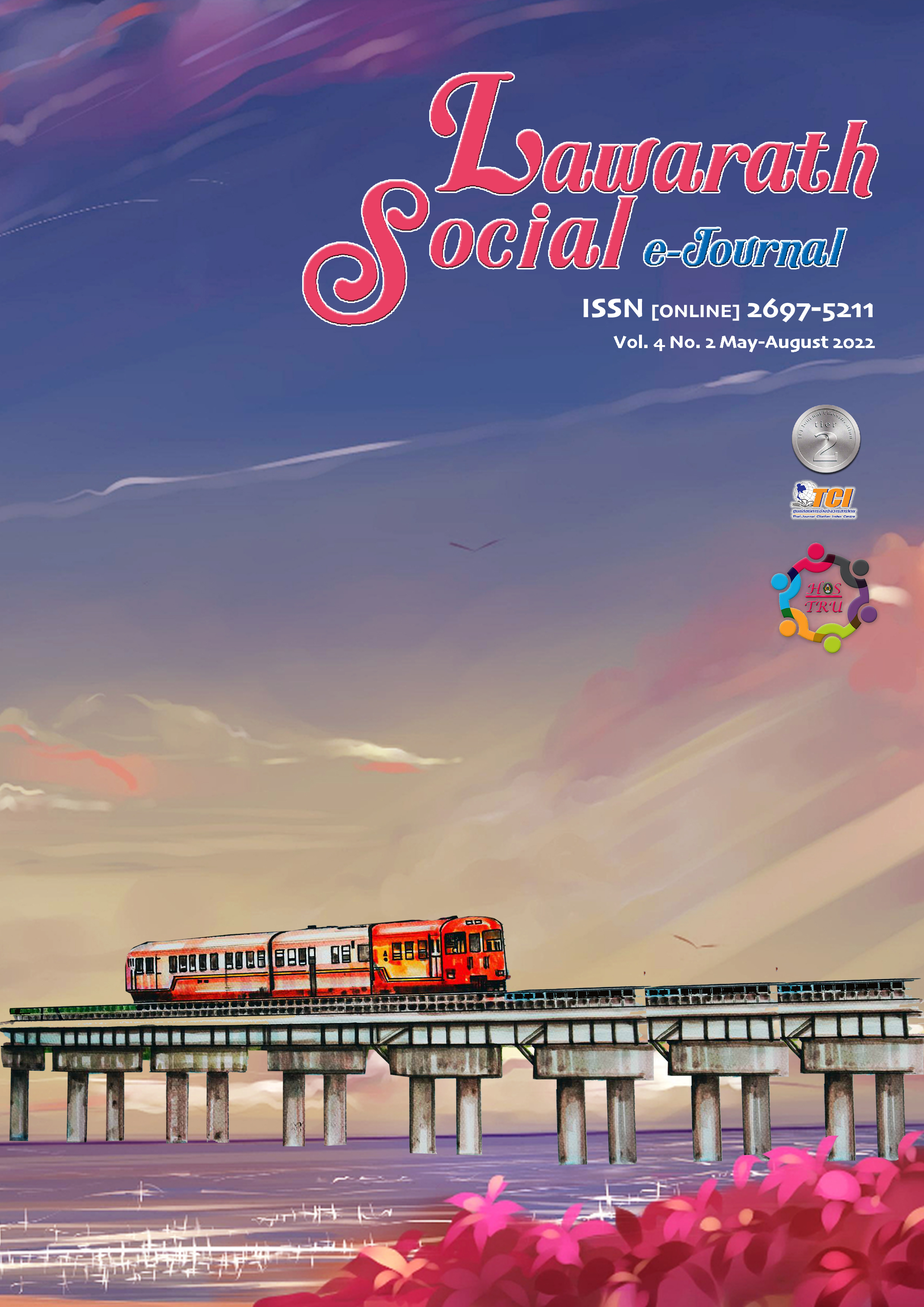Factors Affecting the Development of English Communication Potential of Students in Faculty of Business Administration, Rajamangala University of Technology Krungthep
Keywords:
English Teaching and Learning, English Communication, Factors on English CommunicationAbstract
The research aims to 1) study the students’ opinions toward their English teachers; 2) study the students’ potential on using English in communication; 3) study the factors affecting the students’ improvement in English communication and 4) explore the ways on how to improve the students’ potential on English communication. The four hundred student samples were from the Faculty of Business Administration, Rajamangala University of Technology Krungthep in the academic year of 2021. The five rating scales questionnaire was employed for the data collection. Descriptive statistics such as percentage, frequency, mean, standard deviation, t-test, and inferential statistics were employed for the data analysis.
The results suggested that: 1) in terms of the students’ opinions on the teachers, it found that the factors including teachers’ knowledge of subject matters and contents, their charming personality, and the proper teaching preparation were regarded at a high level; 2) for the students’ potential of using English in communication, it showed that, in overall, was also at a high level; 3) the factors affecting the students’ development of English communication potential included: their aptitude and background knowledge of English, attitudes towards English learning, teachers, and learning environment, and 4) for the possible ways to improve the students’ potential on English communication, the results suggested that teachers should create the leaning innovations to support the students’ English self-studying. Moreover, teachers should find ways to promote the students’ positive attitude toward English language learning as well as arrange a suitable learning environment to enhance the student’s potential on using English in communication.
Downloads
References
จารุพร ตั้งพัฒนกิจ. (2563, พฤษภาคม). อิทธิพลของปัจจัยที่ส่งผลต่อการพูดสื่อสารภาษาอังกฤษ โดยมีแรงจูงใจเป็นตัวแปรคั่นกลางและความวิตกกังวลเป็นตัวแปรกำกับ. วารสารบริหารธุรกิจและศิลปศาสตร์ ราชมงคลล้านนา, 8(2), 111-126.
จุรินทร์ ลักษณวิศิษฎ์. (2552). ทิศทางการพัฒนาคุณภาพอุดมศึกษาไทย. กรุงเทพฯ: สำนักงานคณะกรรมการการอุดมศึกษาแห่งชาติ.
ธนวัฒน์ อรุณสุขสว่าง. (2558). ปัจจัยที่ส่งผลต่อความสามารถในการใช้ภาษาอังกฤษตามทักษะการเรียนรู้ในศตวรรษที่ 21 ของนักเรียนมัธยมศึกษาปีที่ 6 เขตพื้นที่การศึกษามัธยมศึกษา กรุงเทพมหานคร เขต 2 เพื่อรองรับการเข้าสู่ประชาคมอาเซียน. กรุงเทพฯ: มหาวิทยาลัยศิลปากร.
ธีราภรณ์ พลายเล็ก. (2560). รายงานการวิจัยเรื่องปัจจัยที่มีผลต่อการพูดภาษาอังกฤษของนักศึกษาชั้นปีที่ 2 สาขาวิชาภาษาอังกฤษ คณะครุศาสตร์ มหาวิทยาลัยราชภัฏในเขตกรุงเทพมหานคร. กรุงเทพฯ: มหาวิทยาลัยราชภัฏสวนสุนันทา.
นงสมร พงษ์พานิช. (2554, มกราคม-มิถุนายน). การศึกษาปัญหาของการพูดภาษาอังกฤษในการสื่อสารด้วยวาจาของนิสิตคณะวิทยาการจัดการ มหาวิทยาลัยเกษตรศาสตร์ วิทยาเขตศรีราชา ตุลาคม 2550 ถึง กันยายน (2551). วารสารมนุษยศาสตร์วิชาการ คณะมนุษยศาสตร์ มหาวิทยาลัยเกษตรศาสตร์, 18(1), 85-97.
นิตยา วัยโรจนวงศ์. (2543). การศึกษาปัจจัยที่มีต่อความสามารถในการออกเสียงภาษาอังกฤษ ของนักเรียนระดับอุดมศึกษาศึกษาเฉพาะกรณี: นักศึกษาชั้นปีที่ 1 สถาบันราชภัฏสวนดุสิต. วิทยานิพนธ์ปริญญาดุษฎีบัณฑิต จุฬาลงกรณ์มหาวิทยาลัย.
นุชนาฎ วรยศศรี. (2544). ปัจจัยที่มีความสัมพันธ์กับผลสัมฤทธิ์ทางการเรียนภาษาอังกฤษของนักศึกษาสถาบันเทคโนโลยีราชมงคลพระนครใต้. วิทยานิพนธ์ปริญญามหาบัณฑิต มหาวิทยาลัยศรีนครินทรวิโรฒ.
ปรัชญา บินหมัดหนี, โสรัตน์ อับดุลสตา, และชัรฟุดดีน หะยี. (2561, กรกฎาคม-ธันวาคม). ศึกษา
สภาพและปัญหาการจัดการเรียนการสอนรายวิชาภาษาอังกฤษระดับมัธยมศึกษาตอนปลายของโรงเรียนเอกชนสอนศาสนาอิสลามใน 3 จังหวัดชายแดนภาคใต้. วารสาร AL-NUR บัณฑิตวิทยาลัย, 13(25), 25-35.
ยุพเยาว์ เมืองหมุด. (2554). รายงานการวิจัยเรื่องการศึกษาปัจจัยที่มีผลต่อความสามารถในการพูดภาษาอังกฤษของนักศึกษาแรกเข้าระดับปริญญาตรี หลักสูตร 2 ปีต่อเนื่อง. กรุงเทพฯ: สาขาภาษาอังกฤษเพื่อการสื่อสาร คณะศิลปศาสตร์ มหาวิทยาลัยเทคโนโลยี ราชมงคลสุวรรณภูมิ วิทยาเขตพระนครศรีอยุธยาวาสุกรี.
วรวรรธน์ ศรียาภัย, กรรณิการ์ รักษา, และคนึงนิจ ศีลรักษ์. (2553). ความต้องการคุณลักษณะบัณฑิต
ทางภาษาและการสื่อสาร ของสถานประกอบการ. Chophayom Journal, 21(2553), 36–50.
วันเพ็ญ ภุมรินทร์. (2563, มกราคม–มิถุนายน). ทัศนคติในการเรียนที่ส่งผลต่อพฤติกรรมในการเรียนภาษาอังกฤษของนักศึกษามหาวิทยาลัยเทคโนโลยีราชมงคลธัญบุรี. วารสารศิลปศาสตร์ มหาวิทยาลัยรังสิต, 15(2), 29-42.
Bloom, B. S. (1976). Human Characteristic and School Learning. New York: McGraw-Hill.
Byme. (1986). Teaching: An Introduction. New York: McGraw-Hill.
Cole, P. G., &Chan, L. K. (1987). Teaching Principles and Practices. New York: Prentice Hall.
Gardner, R. C., &Lambert, Wallace E.. (1972). A Social Psychology and Second Language Learning. London: Arnold.
Jakobovits, Loen A. (1971). Foreign Language Learning: A Psycholinguistic Analysis of the Issues. Rowley Mass: Newbury House.
Prapphal, Kanchana. (2001, November-December). English Proficiency of Thai Learners and Directions of English Teaching and Learning in Thailand. Journal of Studies in the English Language, 5(2), 110-121. Retrieved from https://www.tci-thaijo.org/index.php/jsel/article/view/21840.
Klein, Wolfgang. (1990). Second Language Acquisition. London: Cambridge University Press.
Krashen, S. D. (1982). Principles and Practice in Second Language Acquisition. n.p.: Oxford Pergamon Press.
Millman, Jason. (1981). Handbook of Teaching Evaluation. London: Sage.
Oler. (1979). The Communicative Approach to Language Teaching. London: Oxford University Press.
Scott, Roger. (1981). Speaking in Keith’Johnson and Keith Morrow in Communication in The Classroom. London: Longman Group Ltd.
Downloads
Published
How to Cite
Issue
Section
License

This work is licensed under a Creative Commons Attribution-NonCommercial-NoDerivatives 4.0 International License.



